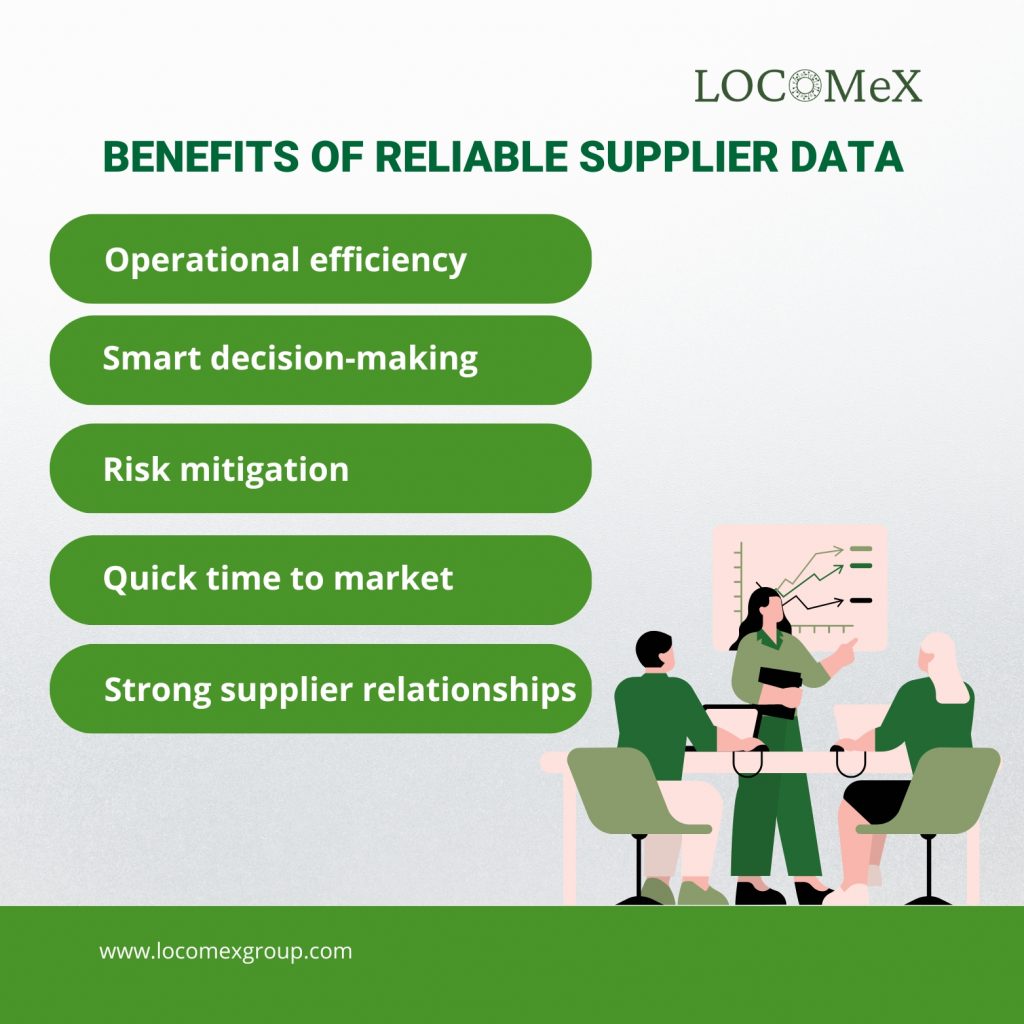540
In today’s intricate world of business, data is a critical asset. Among various types of data, supplier data holds a significant place, especially in businesses that rely heavily on suppliers for their operations. Accurate and organized data about suppliers, their products, prices, and delivery times can help businesses plan better and operate more efficiently.
The businesses must have reliable supplier data related to key concepts such as precise vendor information, data quality, supply chain, customer fulfillment, and more. This data is an essential element of efficient data management and plays a vital role in a company’s supply chain. This article will discuss the significance of reliable supplier data, as well as how it streamlines procurement and addresses frequent issues.
Key Takeaways
- Strong supplier data is essential for success and driving informed decisions.
- AI-powered supplier data ensures confident decisions, mitigating risks and fostering relationships.
- Supplier data management continually enhance accuracy throughout the supply chain.
- Enhanced data accuracy streamlines sourcing, benefiting procurement.
Benefits Of Accurate And Reliable Supplier Data
1. Operational Efficiency
Error-free supplier data highlights the supplier’s skills, locations, pricing, risk level, and dependability. This transparency enables organizations to simplify processes and align with their suppliers.
2. Smart Decision Making
Inaccurate supplier data is frequently out of date, which means that leaders make decisions based on incorrect or outdated information. The outcome? Project delays and stoppages flow down to the customer, causing inconvenience on both sides.
Meanwhile, real-time, accurate data helps management make strategic decisions by providing essential insights into supplier performance, market trends, and cost structures. This information enables businesses to capitalize on potential markets and transition to new, better suppliers as needed.
3. Risk Mitigation
Organizations are held accountable for the activities and practices of their suppliers, particularly tier-two and tier-three suppliers. Accurate supplier data allows executives to detect potential risks and weaknesses across the supply chain. It also enables management to make more informed decisions, predict risks, and take proactive steps to prevent costly interruptions and fines.
4. Quick Time to Market
Automating procedures may help businesses become more agile and reduce time to market. This may involve lowering the time it takes to implement new products or services.
5. Strong Supplier Relationships
Transparency is the foundation of trust. Executives who have access to more precise supplier data can build closer connections with their suppliers. Better data levels the playing field for reliable suppliers and procurement experts by fostering transparency and encouraging open communication.
LOCOMeX’s Supplier Diversity Data Analytic Solutions provides a supplier database that empowers businesses to acquire valuable insights and optimize their supplier diversity initiatives, thereby enhancing decision-making and strategic planning.

The Consequences of Unreliable Supplier Data
Inaccurate supplier data can have serious consequences:
Poor Data Quality: Unreliable data results in subpar data accuracy, influencing decision-making and causing errors.
Increased Costs: Unreliable data can lead to increased costs. For example, if a supplier’s pricing information is incorrect, it could result in overpayment.
Supplier Relationships: Incorrect information can strain supplier relationships. If a business continually has issues with a supplier due to incorrect information, it could damage the relationship.
Brand Reputation: Inaccurate information can harm a business’s brand image. If a business cannot deliver on its promises due to inaccurate supplier data, it could damage its reputation and lose customers.
Best Practices For A Reliable Supplier Data
1. Data Standardization: This involves organizing data in a consistent format. Uniform and consistent data management makes it easier to manage and analyze data.
2. Data Governance: This involves implementing policies and procedures to manage data effectively. Good data governance ensures data integrity and reduces the risk of data quality issues. It also ensures adherence to industry standards and legal obligations.
3. Supplier Information Management: This involves managing all information related to suppliers. It includes maintaining a supplier database, using a supplier pylon, and regularly updating supplier profiles.
4. Supplier Onboarding: This involves collecting and verifying data when a new supplier is onboarded. It’s crucial to ensure the data is accurate from the start.
5. Regular Data Audits: Regular data audits can help identify and correct inaccurate data. It can involve checking multiple records, using manual processes, or leveraging data sources.
LOCOMeX offers advanced Supplier Diversity Program Management Software, empowering businesses to seamlessly oversee and enhance their vendor diversity initiatives with precision and efficiency.
Leveraging Technology For Reliable Supplier Data Quality
The constant swings in the supply chain make it difficult to keep correct supplier data, especially when doing it manually. This is where Artificial Intelligence, Machine Learning, and intelligent automation can help.
AI is capable of effectively analyzing massive volumes of data, which is hard to achieve manually. AI-powered supplier data platforms eliminate the need for suppliers to update their supplier pylons manually. As a consequence, procurement professionals don’t have to worry about out-of-date data since AI regularly updates your platform to represent the most current and correct information.
Furthermore, supplier data foundations may validate data, discover defects, and identify potential risks. For instance, if a supplier in your network fails to comply with existing consumer privacy regulations, AI will detect this and escalate it to the appropriate party. Alternately, if the system finds redundant data, it may eliminate irrelevant data, expediting the process and enabling hassle-free decision-making.
So, What is the one thing these offerings all have in common? Your staff and suppliers are no longer responsible for sorting through huge volumes of data to get relevant, accurate, and up-to-date information. Thus, supplier data foundations reduce the chance of human mistakes in the sourcing process, allowing you to be confident that you are working with accurate information.
LOCOMeX, acknowledged as the Best AI-Powered Supply Chain Optimization Software, is transforming how businesses oversee and streamline their distribution chain operations.
Conclusion
The importance of reliable supplier data transcends various dimensions of business operations. Businesses that effectively prioritize and manage their supplier data accuracy gain a substantial advantage in the dynamic and competitive business landscape, spanning from optimizing supply chain efficiency to enhancing client fulfillment, ensuring regulatory compliance, and leveraging advanced technology. By ensuring accurate supplier data, businesses can reduce costs, improve supplier relationships, and ultimately enhance their market advantage.
FAQs
Why is data quality important for businesses?
Data quality is crucial for accurate, reliable, and complete decision-making, forming the basis for operational efficiency and strategic planning.
How does reliable supplier data contribute to a competitive edge?
Reliable data helps businesses to make informed decisions, build strong relationships, and respond swiftly to market changes, providing a competitive edge.
How does reliable supplier data impact customer happiness?
Reliable supplier data ensures product availability, timely deliveries, and consistent quality, directly impacting customer satisfaction by meeting expectations.
What role does technology play in maintaining reliable supplier data?
Technology, including business intelligence tools and AI applications, automates data management processes, ensuring accuracy and providing valuable insights for decision-making.
